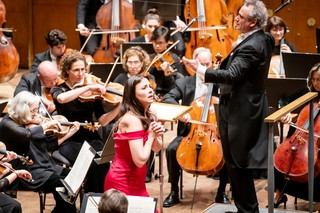|
Back
Gallic Magic from Mr. Louis Langrée New York
David Geffen Hall, Lincoln Center
03/05/2020 - & March 7, 10*, 2020
Claude Debussy: Prélude à l’après-midi d’un faune – Nocturnes
Maurice Ravel: Shéhérazade
Alexander Scriabin: Le Poème de l’extase, Opus 54
Isabel Leonard (Mezzo-Soprano), Robert Langevin (Flute), Ryan Roberts (English horn)
Women’s Chorus from Juilliard School, Pierre Vallet (Choir Master), New York Philharmonic Orchestra, Louis Langrée (Conductor)

I. Leonard, L. Langrée (© Chris Lee)
“I cannot choose but kneel here and adore.”
John Keats, on “Sirens”, Endymion
“I do not think they will sing to me.”
T.S. Eliot, on “Sirens”, The Love Song of J. Alfred Prufrock
I looked with near-astonishment at seeing that this was the “New York Philharmonic debut” for Louis Langrée. From May to September, Mr. Langrée is the most familiar face in Lincoln Center, and for good reason. He has led the Mostly Mozart Festival (and axiomatically the Mostly Mozart Orchestra) for seemingly several decades. Starting as a “summer substitute” his prowess with his hands (never the baton), his personality, and his leadership in broadening out from Mozart through the centuries has made him an endearing figure.
At least for those who don’t camp out to the Hamptons or who go on the European Grand Tour.
Seeing this stately figure again, in tux and tails, he was made for the program he had prepared. This was fin de siėcle, and one-hundred percent Gallic. (Outside of his all-powerful mystic streak, Scriabin would have shed his birthplace of Russia to be born in Paris.) All three of the composers felt an alliance with great poets of their generation. And last night, the three were as exotic as the art of their decades.
Mr. Langrée, born and educated in France, today a familiar figure throughout the United States, was made for this music. Yes, his Mozart during the summer is delightful. But from the first flute solo in Debussy’s Prélude à l’après-midi d’un faune, played by Robert Langevin, one knew this was going to be an evening of nuance and color.
Not garish color by any means. That Debussy had the cool hushed colors of a Manet, the conductor didn’t look for crescendos, but came close to the swells and tides of La Mer.
In a way, the opening of Nocturnes was less a separation than a continuation of the Prelude. The “Nuages” didn’t float over the orchestra: these were cirrus clouds, formless, amorphous, not pieces of imagination as whispering breaths of air.
The full orchestra finally had a chance to exhale hard in the “Fêtes”, a Bayeux tapestry of dancers. And finally, “Sirènes” with the wordless voices of the Juilliard Women’s Chorus, the most enchanting movement of all. They were not offstage, but in the orchestral forces so their voices were hardly understated.
How Odysseus would have responded to these mysterious chords is questionable. After all, the Sirens were not women at all but monstrous birds with women’s heads. But at least we in the audience didn’t need wax in our ears to resist those sounds.
After the intermission came a work with very special meaning for me. Many years ago, I took at 12-hour jarring bus ride east from Teheran to Mashad, on the Afghani border. No war was ensuing them, but it was a religious holiday, and Mashad was even then a very religious town.
Thus, no hostel would take me in, I was spat upon as a Kaffir, until late that evening, a school-teacher, one of the few Communists in the town, asked me in French to join him and his family. They were delightful, and they were Francophiles, and loved the music of Debussy and Ravel.
And that night they played that rarest of recordings, Ravel’s Shéhérazade. True, this was a recording by Régine Crespin, not the Janet Baker I learned to love. True, this was Persia, not “Araby.” True, the poems were almost indecipherable on his machine. But also true, it is one of Ravel’s most intense and atmospheric and haunting song-cycles.
So hearing the trio of songs live, with Mr. Langrée’s conducting, so devoted to the filigree veils of the poems, was as memorable as Isabel Leonard’s rich and so emotional voice. For these were not decorative poems or notes, they were inwardly dramatic, by a composer whose own mind wandered over the planet, from France to Madagascar, whose home was like a Japanese cottage and whose music was often from a planet of his devising.
This of course was the goal of Scriabin. But where Ravel was abstemious, quiet, a perfectionist who rationed his notes to fit his idea, Scriabin’s personal life was of extremes, his early works were little better than salon pieces, his final work was the dream of an opium-smoker.
The Poem of Ecstasy, smack in the middle, enchanted me as a child, and it is still an ultra-Romantic extravaganza. One must then face it as in one of the waves in Debussy’s Mer. You ride with the waves, you are tossed upward and down, you drown in the luscious end-of-century harmonies, you hear the mermaids and Sirens.
Scriabin’s trumpets were the trumpet of Gabriel, the strings, under the hands of conductor Langrée, became like a consort of harps.
It was, yes, a much of a muchness, but it was–if not as ecstatic as Madame Blavatsky and the other mystics of 1908–certainly fun. And Mr. Langrée allowed that final C Major chord to be as pure as the visionary composer would have envisioned.
Hopefully, Louis Langrée will assume his summery execution with the Mostly Mozart Orchestra. And prayerfully, may he return with a program like this, put together with both fervency and adoration.
Harry Rolnick
|